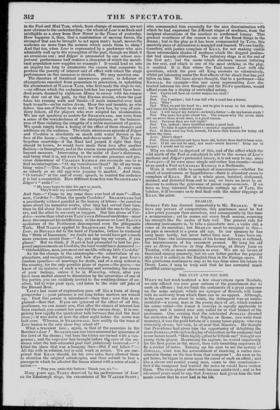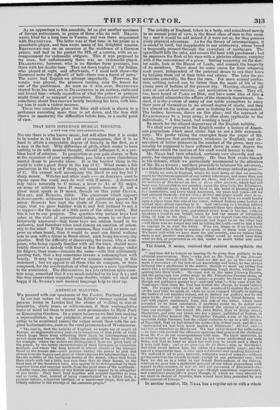THE CUFF AND THE KISS.
WHEN we last week tendered a few observations upon Roulade, we only offered our own poor notions of the punishment due to such an offence ; but.we think the sentiments of a great composer on the same subject, which are apropos of flourish, will come with an authority from which there can be no appeal. Although, in the case we are about to relate, the delinquent was an instru- mentalist—a young man in the young days of art, which renders his crime venial—the lesson it conveys is equally applicable to singers, and is indeed now only called for in that branch of the profession. One evening that the celebrated JOMELLI directed the orchestra of the Opera at Naples or Rome, (we write from memory), it was the good fortune of a young tenor-player, who was extremely clever, but vain, to sit near that Maestro. He thought that Providence had given him the opportunity of delighting the great JomEL Li,with such a display of execution as the composer• had never before heard. "How highly-gifted he'll think me!" thought our young viola-player. Repressing his rapture, he waited impatiently fbr the first pause in the music, then with trembling eagerness let fly a rocket of notes. Turning up his eyes to see the ecstacy of JOMELLI,. what was his astonishment at receiving a rather con- siderable thump on the face from that composer ! As soon as he got home, he began to muse upon the cause of such an effect ; and like a clever and candid young man, came to this conclusion— that if the composer had wanted the notes he would have written them. The viola-player afterwards became celebrated ; and in his advanced years used to say, that JOMELLI had given him the best music lesson that he ever had in his life. As an appendage to this anecdote, let us give another specimen of foreign enthusiasm, in praise of those who do well. DRAGO- NETTI lived for a long time in Vienna, and was there acquainted with BEETHOVEN. The latter was at that time in his prime as a pianoforte-player, and then wrote many of his delightful sonatas. BEETHOVEN was on an occasion at the residence of a German prince, and had in his pocket the MS. of a sonata, with an ac- companiment for violoncello obligato. This it was proposed to try over, but unfortunately there was no violoncello-player. DRAGONETTI, however, who is no flincher from passages, was there with his double bass. They sat down to play it : the Italian, who played at sight, said afterwards, " I must look close—the Germans write the difficult?! of hell—there was a forest of notes." The naive bad English we attempt imperfectly. However, the sonata was played, the princess turning over the leaves for one of the performers. As soon as it was over, BEETHOVEN started from his seat, ran to DRAGONETTI in an ecstacy, embraced and kissed him—wholly regardless of what the prince or princess might think of so rampant a procedure. DRAGONETTI grumbled something about BEETHOVEN nearly breaking his bass, with kiss- ing him in such a violent manner. These two anecdotes place the false skill which is shown in a performer executing more than is set down, and the true skill shown in mastering the difficulties before him, in a useful point of view.



















 Previous page
Previous page